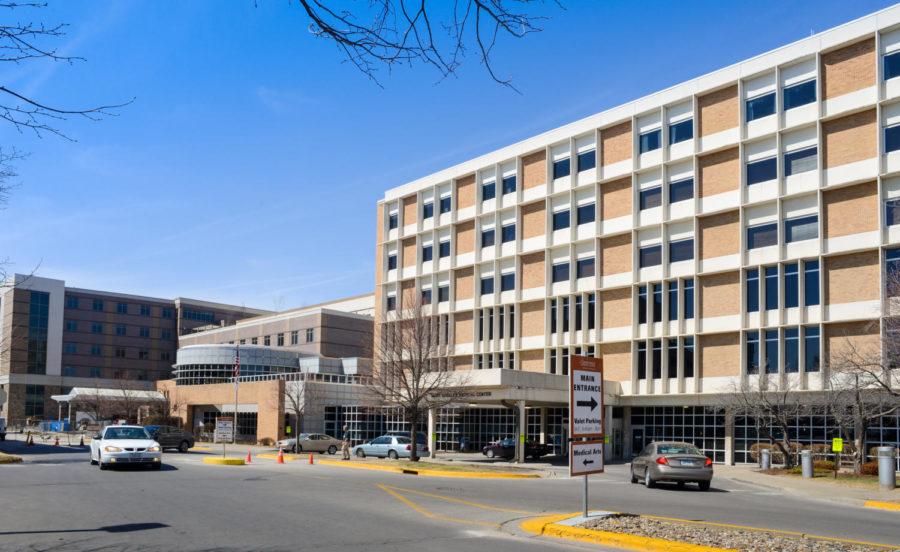Story County response team helps sexual assault survivors
Mary Greeley Medical Center is one place where students can go to report a sexual assault and receive medical attention. The Story County Sexual Assault Response Team will meet sexual assault survivors there to offer services and give them the opportunity to be involved in an investigation.
January 27, 2015
When someone reports being sexually assaulted, the last thing they want to worry about is paying for the medical tests or support services.
That’s why the Story County Sexual Assault Response Team, or SART, offers free response services for those who report being sexually assaulted, said Steffani Simbric, Story County SART coordinator.
Once an assault is reported at one of the SART agencies — Thielen Health Center, Mary Greeley and Story County Medical Center — a three-person response team visits the survivor on-site.
The team includes a sexual assault nurse examiner who has special training in collecting sexual assault evidence, a sexual assault advocate who offers emotional support and victim rights education and a law enforcement officer who takes a report of the investigation, depending on how involved the survivor wishes to be.
Anthony Greiter, outreach officer with the department of public safety, has been with Story County SART since 2006 and said the survivor is always in control of how involved he or she would like to be in the investigation.
“My goal as a law enforcement officer responding to sexual assaults is to put the power back in the hands of the victim so they are in control of how and when they share their account of the events that took place,” Greiter said. “Every step of the way, I try to make them feel as comfortable as possible.”
Simbric said helping the survivor feel safe, yet empowered is important.
“The theory is that all the power has been taken away from the victim in a sexual assault, so we want to restore that for them,” Simbric said.
The survivor may choose any or all of the services SART offers, and Simbric said a majority of survivors accept all the offered services.
In early conversations with law enforcement, it can be difficult for the survivor to decide if they would like to press criminal charges, Simbric said. Iowa law allows the survivor a 10-year period to pursue a criminal case against the accused. If the survivor was under the age of 18 when the assault took place, he or she has 10 years after the 18th birthday to report.
Though the survivor has this amount of time to press charges, physical evidence does not last that long. The survivor has 120 hours after the incident to decide whether they would like to go through the sexual assault examinations.
“The chances of collecting any evidence on the body after 120 hours — or five days — is slim to none,” Simbric said.
Going through the physical examinations can help make a stronger case for the survivor if he or she chooses to wait years to pursue charges, Greiter said.
If a survivor chooses to report being assaulted and decides to go through the medical process, Greiter said he or she should avoid showering, urinating, brushing teeth, changing, eating or drinking prior to the examination.
If a sexual assault is reported to have taken place on the ISU campus between students, the university is required to respond in compliance with Title IX, which states: “The Dean of Students Office and ISU Police may take immediate interim actions to protect the safety of the university community, to enable students with complaints and witnesses to continue studies, and to ensure the integrity of an investigation.”
Once the university is aware of an assault, it must decide whether it is an ongoing threat capable of being sent out as a timely warning to the university community.
Robinette Kelley, director of the Office of Equal Opportunity, said the university’s goal is to make sure the survivor and the campus community are safe.
If the incident is within university jurisdiction, the university generally has about 60 days to perform an investigation, unless the university can provide viable reasons for a delay in the investigation, while still proving progress in the investigation.
“[The university] takes these very seriously,” Kelley said. “Campus safety is a primary concern.”
During an investigation, the university is not allowed to disclose any specific information with the public or media in concern with the survivor and the case.
Kelley said the recent reports of sexual assaults may not be because of an increased number of sexual assaults on campus, but because of an increased empowerment of survivors to step forward and report the incident.
“People feel more empowered and we’ve created a culture where people are reporting, since it is one of the least reported crimes or acts that can happen,” Kelley said. “If we’re creating an environment in campus culture that encourages people to come forward, then we are doing our due diligence in trying to resolve the campus of these types of situations.”

















